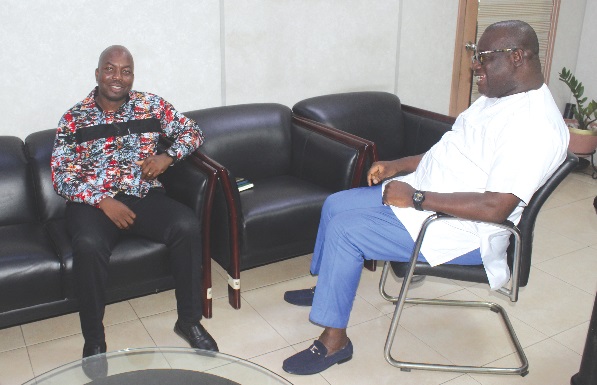
Power production in danger: ECG owes IPPs $1.4billion
Independent power producers (IPPs), the electricity generation companies that control 50 per cent of the country’s generation mix, have called on the government to urgently settle its indebtedness to them.
The nine companies said the Electricity Company of Ghana (ECG) owed them about the cedi equivalent of $1.4 billion as of last month.
The Independent Power Generators, Ghana (IPGG), formerly known as the Chamber of Independent Power Producers, Distributors and Bulk Consumers, told the Daily Graphic in an exclusive interview that the government must pay up at least the overdue debt which constituted more than half of the indebtedness.
“If the ECG does not pay up part of the debt owed our members, they cannot guarantee continuous production of power for the next two weeks. The situation is so dire that something urgent must be done,” the Chief Executive Officer (CEO) of the IPGG, Dr Elikplim Apetorgbor, told the Daily Graphic in the interview.
He said the debt meant that the IPPs did not have working capital to finance inputs such as chemicals for treating water for the thermal generators, as well as other supplies, many of which were denominated in foreign currency, mostly the dollar.
Dr Apetorgbor said the IPPs had always chosen the diplomatic way of resolving such bottlenecks and had, therefore, been quiet over the challenges over the years.
However, he said, the current situation was so dire that the IPPs’ only option would be to shut down operation until such time that the debt would be paid, an option they wish not to pursue.
The CEO said the IPGG owed banks, and that some had to make repayments this month but had to pay penalty for defaulting, saying the IPPs had been suffering on the quiet from the mounting debts.
“These penalties should be surcharged to the ECG, but we have decided to absorb them onto our books. However, for now the circumstances are not helpful.
“We are not telling the government to pay all; it can pay the overdue debt and negotiate a payment plan with our members,” Dr Apetorgbor said.
Cash Waterfall Mechanism
The Cash Waterfall Mechanism (CWM) is a system created by the government to centralise revenue collection and ensure transparency in what has been collected and who is due what payment.
The system is also to ensure that the offtaker, the ECG, does not use its discretion in paying IPPs but each must have what it is owed.
Dr Apetorgbor said for some time now the Cash Waterfall system was not living up to expectation, as figures were not shared and payment not effected on schedule.
“We note that the CWM which was meant to bring transparency and fairness in the disbursement of the power sector revenue, unfortunately, has failed to deliver such transparency,” he said.
He said although the IPGG controlled a large chunk of power production in the country, its members were not represented on the CWM management committee, which was rather replete with representatives of state-owned power entities.
The CEO said the only information members received was bank credit alert, even though they were key stakeholders controlling over 50 per cent of the market share.
“While we welcome the indication that a review of the CWM will be part of the critical energy sector reforms, we emphasise that issues of transparency and governance of the CWM must be part of the agreed reforms and our interest duly represented on the CWM committee,” Dr Apetorgbor said.
Renegotiation
The IPPs also kicked against any renegotiation of their contracts, the power purchase agreements (PPAs) with the ECG.
In that regard, Mr Apetorgbor emphasised that except for the inputs and other variables to derive the tariffs, “our members' tariffs remain fixed for the entire life of our respective PPAs”.
He said any potential reconsideration of the tariffs would need to be balanced with commensurate changes to the inputs and variables.
“Our members reject any notion of restructuring their arrears/claims as part of the ongoing or any future debt restructuring programme. Our members are prepared to engage the government on payment schedules with regard to the arrears and other claims under the respective PPAs in order to promote predictability of payment flows, pending the energy sector reforms which are key to eliminating any further accumulation of arrears,” he said.
The IPPs include Aksa Energy, Amandi Energy, Cenit Energy, Cenpower Generations and Early Power.
The rest are Karpowership Ghana, Meienergy, Sunon Asogli Power and Trojan Power.
ECG
Reacting to the debt issue, the Director of Communications of the ECG, William Boateng, said the power distributor was keen to reduce its debt to the IPPs and was making every effort to make payments.
He said the ECG recognised the dire situation, hence its decision to embark on a revenue mobilisation exercise, indicating that aside from that, it was also in talks with the sole shareholder, the government, to help with payment to not only help reduce the debt but also keep the businesses of both the producers and the distributor running.
“It is a known fact that we owe the power producers, and it is the reason we are embarking on revenue mobilisation to enable us to raise some good money owed us so we can, in turn, settle our indebtedness to the power producers.
“We are keen to do something about it, so we both stay in business, as production, supply and distribution are very critical to our business,” Mr Boateng explained.
